S.C. Skillman's Blog, page 20
April 5, 2021
Book Review: ‘Hamnet’ by Maggie O’Farrell
I waited quite a long time for Waterstones to send me this book; and having received it, I spent the next few hours devouring this story of William Shakespeare’s family and the tragic death of his 11 year old son Hamnet.
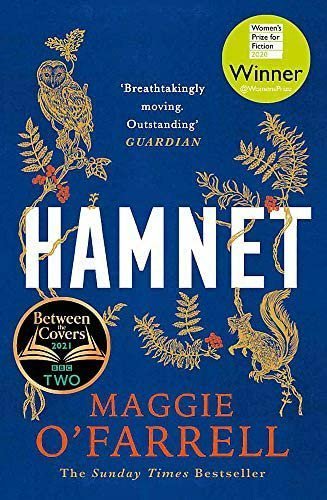 Book cover of Hamnet by Maggie O’Farrell
Book cover of Hamnet by Maggie O’FarrellLiving as I do near Stratford-upon-Avon I have visited all the Shakespeare properties a number of times. I will never experience Shakespeare’s Birthplace the same way again, now I have read this book. As I enter the rooms, I will imagine Ann Hathaway giving birth here, to her twins Judith and Hamnet; and in another room I will think of her laying out Hamnet’s body with loving care, sewing him into his shroud; and in another, of John Shakespeare browbeating William, or of his sister questioning or advising him.
Ann in this story is called Agnes; William himself is never named but called either ‘the Latin Tutor’ or ‘her husband’ or ‘their father / brother’. So we think of him in his relationships as an ordinary family man, rather than being distracted by the weight of his awesome reputation, over five centuries later.
The story initially moves back and forwards between two time-frames: the time of Agnes’ pregnancy with Suzanne, and the turbulent reaction of the families, and her subsequent marriage to Will; and then to the final 24 hours of Hamnet’s life, 13 years later as he falls victim to the Bubonic Plague. Life and death, beginnings and endings, are constantly interwoven, folding back on each other.
I found the book very intense, full of exquisite moment-by-moment accounts of highly emotional events, and the long period of Agnes’ grief, while her husband is in London on one of his long absences.
Will’s sister Eliza is the go-between in that she, unlike Agnes, is literate and can write the letters Agnes dictates and read the letters Will sends in return. Some have thought William Shakespeare very unloving to his wife and family, spending so much time away from them; but in this story we are offered a much more sympathetic picture. Will asks Agnes to come to London to live with him but she refuses as she fears Judith’s delicate health will suffer in the disease ridden city streets.
Ultimately with his London money Will is able to buy the gracious mansion at New Place; and I loved the descriptions of Agnes creating her dream garden there, planting many fruit trees and medicinal herbs and keeping bees and a host of cats.
The epiphany in this story comes with Agnes’ realisation of the true significance of her husband’s new tragedy ‘Hamlet’.
This is a book which will certainly have you scurrying to Google to check up on the known facts of William Shakespeare’s life and family members. You will see him in a new light and may also be deeply moved by the reality of life and death in 15th & 16th century England. A very highly recommended book.
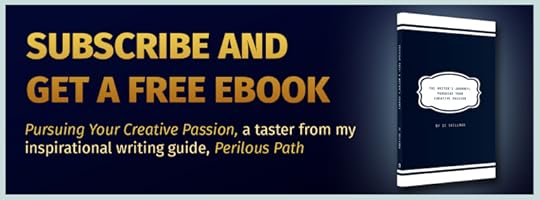 subscribe SC Skillman mailing list
subscribe SC Skillman mailing list
March 29, 2021
A Walk in Jephson Gardens Leamington Spa to Lift the Spirits
We are lucky to have many beautiful places to walk, in Leamington Spa Warwick and Kenilworth, with gardens, rivers, castles, historical houses and parklands. Each time I walk in Jephson Gardens, Leamington Spa, I see new delights. Throughout this pandemic, the natural world has upheld the spirits of so many – and the imagination, hard work, dedication and creativity of gardeners.







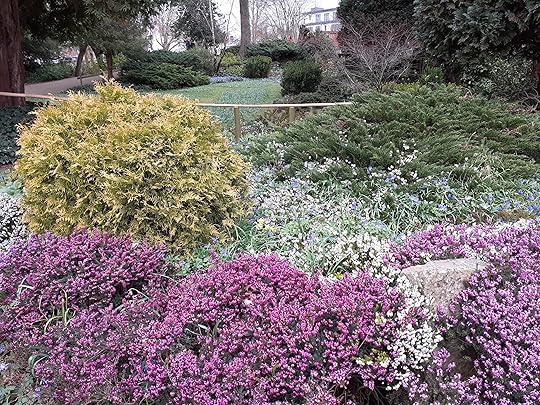 A walk in beautiful gardens to lift the spirits – Jephson Gardens, Leamington Spa
A walk in beautiful gardens to lift the spirits – Jephson Gardens, Leamington Spa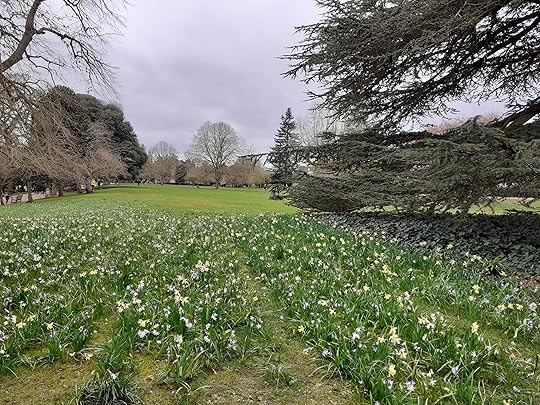
March 22, 2021
Book Review: ‘On This Day She’ by Jo Bell, Tania Hershman and Ailsa Holland
This is a book which will probably arouse many different emotional reactions in the reader: fascination, inspiration, astonishment, disgust, anger, depression… you name the life situation the reader is in, and that will determine his or her response to On This Day She by Jo Bell, Tania Hershman and Ailsa Holland.
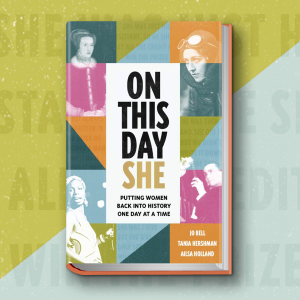
Many different women, across all periods of history and many nations, continents and cultures, are represented in this book. Their lives and achievements encompass the full range of human endeavour, and the vast majority you may never have heard of, because history chose not to include them in its pages. But the cumulative effect of reading their biographies, all arranged under days of the calendar, is disturbing and uplifting by turns.
Some of these women were enormously successful and influential in their own individual spheres; others were treated with gross injustice and / or met untimely and tragic deaths. Some of them are indeed now acknowledged and recognised for their achievements – for example, the woman who invented the game of Monopoly (Lizzy Magie) but who never received either the credit or the income from her invention, which instead went to Charles Darrow.
I do believe there are signs of encouragement. In our world today, we all know about Greta, Malala, An Sang Su Chi, Nicola Sturgeon, Jacinda Ardern, Angela Merkel. Looking at history, we all know the names of such women as Elizabeth I, or Agatha Christie, or Florence Nightingale, or Jane Austen, or Mother Teresa. We do have a number of prominent women in the world today, whom we need to support and honour. This book reminds us that there have been many, many gifted women throughout history who have not been so honoured; in fact, far from that, they have been crushed and denigrated and marginalised. There is still a very long way to go before all members of the human race are treated equally, regardless of gender, and the many other factors which divide us.
Whilst reading this book, one of the many thoughts that came to my mind was this: JK Rowling, whom many admire, is strongly opinionated. She expresses her opinions fearlessly in the public arena, which she has every right to do. But would her opinions receive the same response if she was a man?
 Please do subscribe to my mailing list if you’d like to hear from me with all my writing news. Sign up here.
Please do subscribe to my mailing list if you’d like to hear from me with all my writing news. Sign up here.This book makes you see history differently and through a new lens. Hard-hitting, discerning and sharp, the authors show us the way exceptional female movers and shakers have been rendered invisible by history. Much of this, the authors claim, is the consequence of a lazy use of “generic” language, and sentences framed to denigrate women and represent their role and purpose negatively. They give an example of this in the way in which Catherine of Aragon is summarised by history books as having “failed to provide Henry VIII with a male heir”. This can be rephrased as “Catherine and Henry had no surviving sons.” It’s still accurate, but the balance has been changed. Language needs to evolve to redress this false view of human life.
One astonishing quote in the book, from a man, explains that by ‘person’ he did not of course mean ‘woman’ – he only meant ‘man.’ This is certainly a step further from the assertion that of course the term ‘man’ is always taken by us all to mean ‘human beings.’ Personally I try to use the term ‘humankind’ as much as possible or ‘we’ or ‘human beings’. I do believe language has power; it determines our unconscious presumptions. The words we use do matter; they condition our attitude to the world, and lie behind all our prejudices and false judgements of others.
Among the entries in this books you will find archaeologists, nuclear physicists, mountaineers, peace activists, poets, novelists, artists, anti-slavery campaigners, environmentalists, human rights lawyers, anthropologists, fighter pilots, Viking warriors, nuclear scientist and many more. This book doesn’t presume that women have always been good. Tyrannical rulers are also included. The thesis of the book does not include moral judgements on that level; simply the invisibility of women in our histories.
You will find a woman who completed a course of undergraduate study at Cambridge University but were told she could not be awarded a degree because of being a woman; a female artist who created a famous self-portrait which was by default attributed to her husband; and numerous women who have been defined as ‘muses’ or ‘assistants’ to the more famous men in their lives, when they were in fact equal creators in their own right.
I highly recommend this book to all.
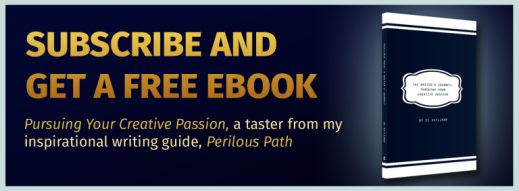
Please do subscribe to my mailing list if you’d like to hear from me with all my writing news. Sign up here.
March 16, 2021
Blog Tour and Book Review: The Healing by Joy Margetts
It is my pleasure today to be part of the blog tour for a beautiful new book from the publisher Instant Apostle, a book which is a debut novel for its author, Joy Margetts.
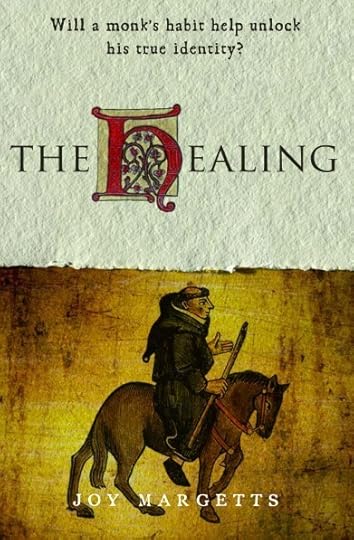
During the Covid19 pandemic many have spoken about the experience of lockdown, and some have felt it has been a time to reflect and step aside from all our normal busyness, and view life with new eyes..
Although I agree with that, nevertheless, I don’t think anything of what we have experienced can compare with the deep inner peace and healing that has for centuries been associated with the monastic lifestyle. In fact the two areas of spirituality seeing the most growth, are those associated with cathedrals and monasteries. Of course, a few years ago many of us enjoyed the TV Series The Monastery, when a group of people from all walks of life and varieties of faith or no faith, tried out life in a Benedictine monastery for a few weeks, to see the impact, if any, it might have on their lives.
 Joy Margetts, author of The Healing
Joy Margetts, author of The HealingThe Healing by Joy Margetts (published April 2021 by Instant Apostle)
Based partly on the author’s own experience, but transferred to 12th century France and Wales, this warm-hearted, compassionate and touching story draws the reader into the relationship between injured warrior/nobleman Philip de Braose (based on a real historical character) and his kind and compassionate mentor Brother Hywel of the Abbey Cymer in Wales.
We journey with Philip and Hywell from Philip’s near death on a French battlefield, and along the way we explore Philip’s traumatic past, and follow his path of healing and transformation, spiritual, emotional and psychological, as well as physical.
The book has the feel of a spiritual classic – a damaged, world-weary character meets a wise mentor who with gentleness and goodness opens up to him a new way of seeing the world and his place in it. Philip is a young man cast adrift, wounded in body, mind, and spirit, and his journey back to Wales with Hywell is a journey from despair to hope and new life. As the journey progresses, Hywel has many lessons to teach Philip, lessons in grace, humility, kindness, compassion and discernment.
Eventually we learn the back stories of both Hywel and Philip, and the tragedies, sorrows and regrets they have both suffered, and how they have come through them. The ability to move forward calls upon all their resources of forgiveness, both of others and of themselves.
Ultimately the story takes a surprising turn and rises to a very moving outcome.
Highly recommended.
The Healing by Joy Margetts is available from Instant Apostle, from the author’s own website http://www.joymargetts.com or from all online book retailers.
Joy’s social media links are as follows:
March 15, 2021
Book Review: The 99th Koala by Kailas Wild
This account of the koala-rescue campaign in bushfire-ravaged Kangaroo Island is gripping and very emotional. Accompanied by superb photos, arborist Kailas Wild tells a story sometimes dramatic and inspiring, and at other times sad and heartrending, packed with tense and harrowing descriptions of koala rescues.
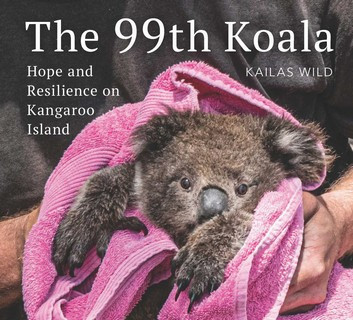
As one of the few professional tree-climbers/ experienced koala handlers called to Kangaroo Island following the wildfires that swept through parts of Australia in 2019, Kailas used his rope climbing equipment to scale 30 metre high burnt trees to flag down traumatised koalas, bundle them into pet carriers, and drive them to the animal hospital for treatment – or sometimes to be euthanised.
As you read the book you feel amazed he didn’t suffer long-lasting mental health difficulties following this incredibly harrowing and challenging time on Kangaroo Island. He is, indeed, very open about his emotional distress and his mental trauma. Throughout the book the reader is moved by his skill and courage, in this dangerous and tough work.
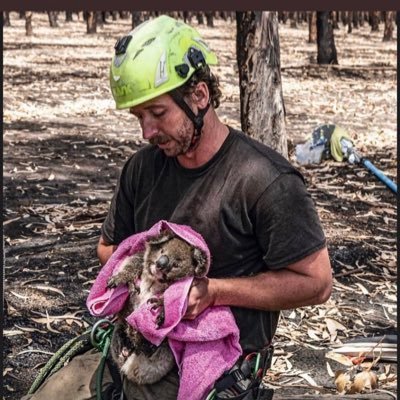 Kailas Wild with rescued koala
Kailas Wild with rescued koalaKailas gives many fascinating details of his work, including for example his knowledge of how to test the structural integrity of a fire damaged tree before he starts climbing; his endurance of scratches from the claws of frightened koalas; and the best way to handle them, to avoid the very real danger of being bitten by their knife-sharp teeth. The photos are often dramatic and impactful; shots of him up a tree trying to reach a koala on an adjacent tree, images of a burnt koala, photos which make clear his own mental trauma, visible in his face.
His working days among the burnt plantations involved 10-12 hours of physically and emotionally draining labour. He spent “days alone amongst burnt trees and dead animals… and even the successful rescues are traumatic.”
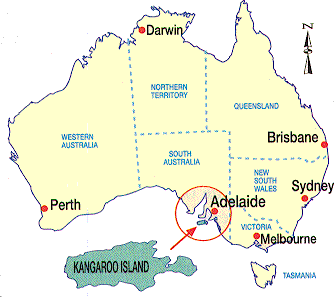
After a considerable time in which he feels a lack of co-ordination and resources, he finally gets the help he needs from two other wildlife rescue experts – Deb and Fraya. The efforts they go to as the terrified koalas resist capture is astonishing. Their own stress is compounded by the knowledge of the stress to which they are subjecting the koalas – and then at the end the rescued animals may have to be euthanised.
The author is very open about the toll this takes on his mental health. He also considers the ethics of human intervention in the lives of wild animals suffering an environmental disaster; does his work compromise the ability of the wild animals to live independently when released back to the wild, having become over-reliant on humans? He also describes the moment when they realise the risk of injury to the koalas themselves outweighs the benefits of attempting rescue.
Finally the time comes when Kailas and his colleagues realise they have done everything they can, and the remaining koalas, having already survived this long, will most likely thrive.
A deeply moving book for all those who love animals, care about environmental issues and are interested in wildlife conservation, but also an account of courageous human endeavour and compassion, in the face of ethical dilemmas.
March 8, 2021
Book Reviews: The Poetry of Phil Hill
Today, I’m pleased to be able to bring you my reviews of a collection of poetry books written by local Leamington Spa poet Phil Hill, which will be of interest not only to all those who love cutting edge contemporary poetry, but also to those who wish to gain a deeper insight into mental health issues in our society.
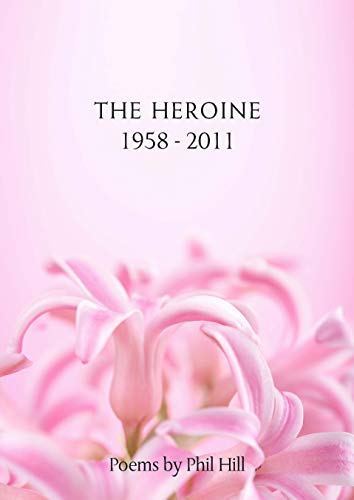
The books are as follows and may be purchased through Phil’s own poetry website Phil Hill Poetry – Books, Amazon Books, Books, Poems
Beyond the Wilderness by PM Hill pub 2018 chipmunkapublishing
Love/Resistance/Rebellion by PM Hill pub 2020 chipmunkapublishing
The End of A Rainbow by Phil Hill pub Jem Stone Publications
Hero by Phil Hill pub Jem Stone Publications
The Heroine by Phil Hill pub Jem Stone Publications
The Heroine
This is a very touching, insightful and vivid collection of poems commemorating the life of Geraldine, the author’s wife, who suffered much from mental illness, and from whose struggles we can all learn, described in spare, unsentimental lines of poetry by Phil Hill.
The poems chart Geraldine’s life from the time she and Phil met through their growing relationship, through some of the challenges of their twenty year marriage and Geraldine’s eventual tragic death, too young.
I found many of the poems very touching and poignant, often giving real insight into how it feels to go through the ill health that Geraldine suffered, with such distressing experiences as panic attacks and obsessive eating binges.
Yet within the poems there are flashes of humour, in the poet’s sharp observations of daily life. His admiration and love for Geraldine shines through. Highly recommended to all those who like the Own Voice genre of literature and who value poems which shine a light on areas of life many may fear to contemplate or would prefer to avoid. If we have never suffered as Geraldine did, we can count ourselves blessed and we can learn from reading of her brave life.
The Hero
Phil Hill is a poet whose observations of contemporary society are both sharp and discerning. He covers major themes such as loss, regret, integrity, conformity and commercial manipulation.
His voice is sensitive, emotionally stirring and both raw and vulnerable. In these poems we see our society reflected back to us, with all its irony, its disposable values, social conditioning and its shaky hold on truth. With touches of humour and flashes of anger, this poet’s voice is one to listen to, and he offers a testimony from which we may leamany orn much.
In many of Phil’s poems, his own voice shines through: strong, powerful and challenging: often showing us how the judgement and labels of others is the very worst thing of all.
Greater education and communication and knowledge and understanding are still desperately needed, although mental health issues are becoming much more prominent on the public agenda. There is a long way to go, for this to infiltrate people’s minds throughout society, but the more people learn about it and gain new understanding and share imaginative and engaging media about it, the more things will improve: ignorance is our greatest enemy.
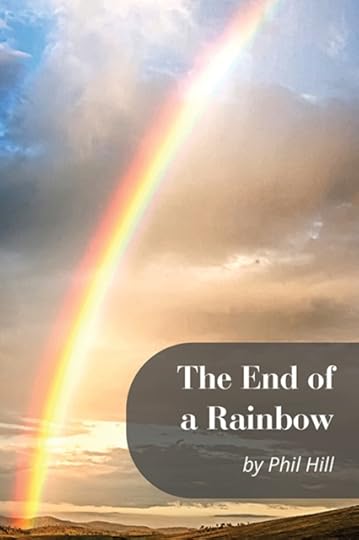
Phil’s poems are often very emotionally stirring: sharp, and relevant to the emotional and psychological landscape of the times we are living through.
His poem about lockdown conveys the feeling of insecurity, fear, disconnection, uncertainty, with very few words. It opens our eyes to the profound psychological effect this will have on so many, long after we have got R down to zero (if we ever do). I look forward to Phil’s first poem when he clearly sees light at the end of the tunnel!
Other poems are sad and yet touching, written with Phil’s characteristic simplicity and economy of words. These are dangerous and uncertain times for all of us.
And Phil writes from a deep place within himself.
The books may be purchased from Shop | Phil Hill Poetry
I recommend Phil’s poetry to you, and to all those who wish to gain a deeper insight into mental health issues.
March 1, 2021
Book Review: Lockdown Innit: Poems About Absurdity by MJ Mallon
During the Covid-19 pandemic I have, like many others, have been writing a Covid Diary. Early on, I knew we were entering into such an extraordinary period of history that I felt compelled to record this journey. My own Covid diary since February 2019, perhaps, should be turned into a long narrative poem like The Ancient Mariner! Certainly the virus has been like an albatross around our necks!
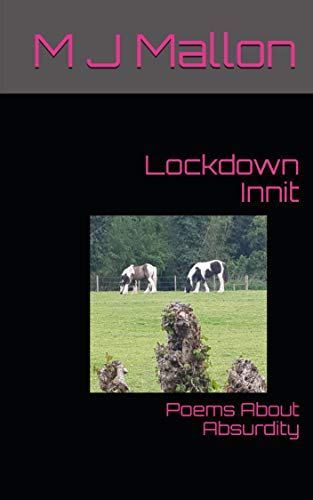
Fellow-author MJ Mallon has chosen to write about the lockdown in a very distinct, individual way, and she has recently published a collection of poems called Lockdown Innit: poems of absurdity.
In this collection of poems, MJ Mallon has given us a wry series of vignettes of our society during a very strange year in history; it reminded me in part of theatre of the absurd, and she carries it out with an admirable lightness of touch. She conveys the folly, the irritability, the absurdity of people’s behaviour, along with a feeling of being lost and adrift.
The reader has a sense of having opened various windows, to see how other people have coped with lockdown. We find honest observation of life: people doing foolish things in supermarkets; quirky observations of nature that may well have gone unnoticed in other, busier times; or which may not have been there for us to see, but for the fact that wild animals too have felt the strangeness, and strayed into the urban environment. Examples given are the appearance of a swan by a dustbin.
We also find gems of delight in all this: the author’s observation of the horses like statues, and the violin player on a tightrope; and I loved the poem about the local village community library. We have a pop-up lending library at the bottom of our road. It demonstrates how human beings can react so differently to crises, and while some withdraw into themselves, doing things that seem selfish or stupid to others, we also find those who come up with inspirational ideas to make life better for those around them.
The poem about breast cancer explores the subject beautifully, showing the author’s relief set against her poignant awareness of others who are not so lucky. Through the entire volume, there floats a sensation of oddness, simply noted and preserved in a poem.
I feel these poems are written by someone who sees life at an angle, shifted one degree by the quiet act of observation.
Highly recommended.
BLURBLockdown Innit is a poetry collection of eighteen poems about life’s absurdities and frustrations during lockdown. Wherever you live in this world, this is for you. Expect humour, a dollop of banter and ridiculous rants here and there. Amongst other delights, witness the strange antics of a swan posing by a bin and two statuesque horses appearing like arc deco pieces in a field. Check out the violin player on a tightrope, or the cheeky unmentionables wafting in the lockdown breeze!
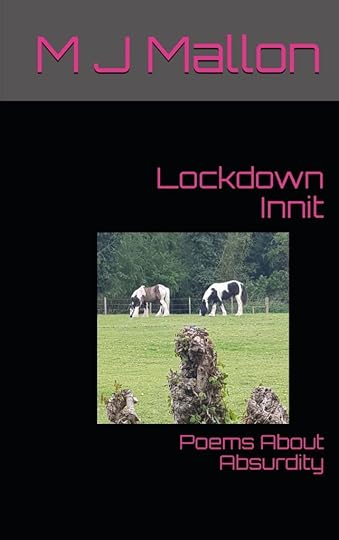 AUTHOR BIO
AUTHOR BIOMy alter ego is MJ – Mary Jane from Spiderman. I love superheroes!
On the 17th of November I was born, in Lion City: Singapore, (a passionate Scorpio, with the Chinese Zodiac sign a lucky rabbit.) My early childhood was spent in Hong Kong. During my teen years, my parents returned to my father’s birthplace, Edinburgh, where I spent many happy years. As a teenager, I travelled to many far-flung destinations. It’s rumoured that I now live in the Venice of Cambridge, with my six-foot hunk of a Rock God husband. My two enchanted daughters have almost flown the nest, but often return with a cheery smile to greet me.
During the day, I work in an international sixth form with students from around the world. I’m the meet and greet lady who welcomes them to their new college and issues them with late slips when they don’t get to their lessons on time!
I write YA fantasy, paranormal, horror/supernatural short stories, flash fiction and short form poetry. More recently, I have produced and compiled an anthology/compilation set during the early stages of COVID-19 entitled This Is Lockdown. Following on from this, in February 2021 I will be releasing Lockdown Innit, poems about absurdity.
I’ve been blogging for many moons at my blog home Kyrosmagica, which means Crystal Magic. From time to time I write articles celebrating the spiritual realm, inspiration and my love of nature, crystals and all things magical, mystical, and mysterious.
My eclectic blog shares my three loves: reading, writing, and creativity. I adore reading and have written over 150 reviews on my blog: https://mjmallon.com/2015/09/28/a-z-of-my-book-reviews/
 AUTHOR SOCIAL MEDIA DETAILS
AUTHOR SOCIAL MEDIA DETAILSAuthors Website: https://mjmallon.com
Authors Amazon Page: https://www.amazon.co.uk/M-J-Mallon/e/B074CGNK4L
Twitter: @Marjorie_Mallon
#ABRSC – Authors Bloggers Rainbow Support Club on Facebook: https://www.facebook.com/groups/1829166787333493/
Goodreads: https://www.goodreads.com/author/show/17064826.M_J_Mallon
BookBub: https://www.bookbub.com/profile/m-j-mallon
Instagram: https://www.instagram.com/mjmallonauthor/
BOOK LINKSKindle Amazon UK: https://www.amazon.co.uk/dp/B08VW81Q53/
Kindle Amazon US: https://www.amazon.com/dp/B08VW81Q53/
Goodreads: https://www.goodreads.com/book/show/56949934-lockdown-innit
Universal link for kindle: https://mybook.to/Lockdowninnit
February 22, 2021
Spring 2021 Writing News
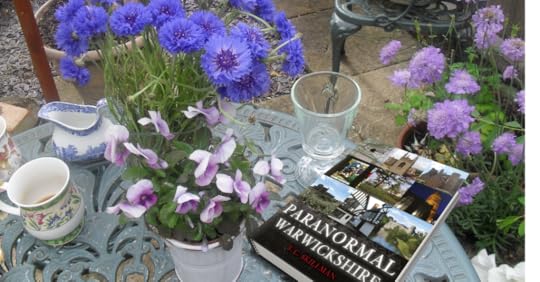
Spring is almost with us and new hope is rising.
What’s new here in Warwick, during what we hope will be the final months of the final lockdown?
I’m following lots of online courses – Pilates classes; online song rehearsals with community choir Songlines; a writing course with the amazing sitcom scriptwriter , which I do with my comedy blogger son Jamie; and a Write Funny course from the very talented and laugh-out-loud writer Fran Hill. And on top of that, I’m doing a Dream Interpretation course – fascinating, challenging, and with plenty of potential for future novels too!
I’ve also taken up acrylic painting. Having been inspired by the Grayson Perry Art Club I’m painting new pictures regularly in a naive style. Lockdown art has been my salvation. Now I have my eyes on the Royal Academy Summer Exhibition…. in my dreams at least!
I’m also well on my way through the last revision of my magical realist novel Director’s Cut.
I hope soon to start working on a new non-fiction book for Amberley. This will be Illustrated Tales of Warwickshire. The sequel to Director’s Cut is half-finished; it’s called Standing Ovation.
In other news, I’ve been recording readings from my books Paranormal Warwickshire, Mystical Circles, A Passionate Spirit, and Perilous Path, and uploading the videos to my You Tube channel. Do listen to the stories here. The videos have been edited by my film and video expert daughter Abigail in Australia; on the film and video editing scene you can work for anyone anywhere in the world!
I hope you are all feeling the new hope in the air, and looking forward to good things yet to come, in a few months’ time.
February 15, 2021
Blog Tour for Debut Novelist Ruth Leigh: Introducing The Diary of Isabella M Smugge
On 7th April 2020 fellow-author Ruth Leigh published a Post under the title “The Utter Joy of One’s Craft” on morethanwriters.blogspot.com.
That was the first appearance of Isabella M Smugge, under that name, out in the world.
I was one of those who left a comment on the post, and many of us were intrigued by the idea of Isabella; I mentioned that I felt I knew her: “Isabella M Smugge turns up at conferences and also moonlights as what I call ‘an internet siren’ – someone who is addicted to telling everyone else online how successful they are and how they did it and how if you exactly follow their own prescription of how they achieved it you too can be enormously successful and make millions.“
On 19th February 2021 a novel is published, with Isabella as its main character, which hadn’t been consciously planned at the time its author Ruth Leigh wrote that blog post. And today I’m part of the blog tour telling you about that novel.
In May Ruth published another post about her despair at the false picture people give about their lives online. The truth, she said, is always in brackets. Then Isabella re-appeared.
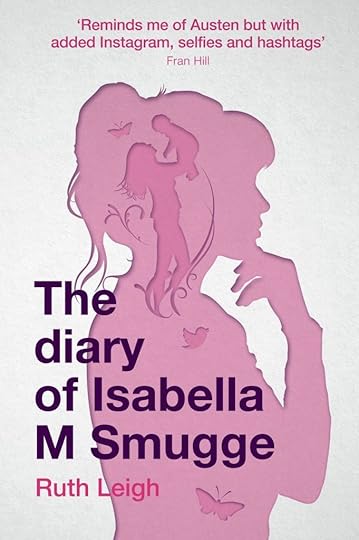 The Diary of Isabella M Smugge by Ruth Leigh published by Instant Apostle 19 Feb 2021
The Diary of Isabella M Smugge by Ruth Leigh published by Instant Apostle 19 Feb 2021Among those who read the post was a literary agent who got in touch with Ruth and invited her to work up two opening chapters of a proposed book about Isabella, and he would see if he could find a publisher for her. The outcome is now clear; the book will be published by Instant Apostle on 19th February 2021.
Now I’ve read the book I realise Isabella reminds me of so many people: Patsy in Absolutely Fabulous; Margot Leadbetter in The Good Life; the “awful aristos” in Ghosts; Meryl Streep’s character in The Devil Wears Prada.
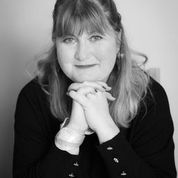 Ruth Leigh, author of The Diary of Isabella M Smugge, published by Instant Apostle 19th February 2021. Ruth is a novelist, blogger and freelance writer based in beautiful East Suffolk. This is her first novel.
Ruth Leigh, author of The Diary of Isabella M Smugge, published by Instant Apostle 19th February 2021. Ruth is a novelist, blogger and freelance writer based in beautiful East Suffolk. This is her first novel.Here’s my own review of the book:
This book is very much a surprise. We can begin to read it thinking it will be a waspish comic satire on the internet phenomenon of aspirational lifestyle influencers, who pretend their lives are perfect, and make everyone else feel they have to live up to it.
In fact the book is a very poignant and touching story about contemporary family life and relationships, the control of social media over our lives, our emotional wounds from the past, our lack of self-knowledge, and our deep need for non-judgemental friendship. To me, the style and atmosphere of the story brings it into the same realm as novels such as ‘The Battersea Park Road to Enlightenment’ by Isobel Losada, and The Handbag and Wellies Yoga Club’ by Lucy Edge, although this book has more of a Christian flavour.
Isabella has moved with her husband and three children from London to a Georgian rectory in Suffolk. She is judgemental, disdainful, and her diary entries often include bitchy remarks at the end of paragraphs. She looks down on others and considers herself “a cut above”. She reminds me of Margot Leadbetter in ‘The Good Life’, and Patsy in ‘Absolutely Fabulous’. In fact I can even hear her superior, cut-glass tones. She also reminds me of Meryl Streep’s character in ‘The Devil Wears Prada’. In waspish, top journalist style, she fills her account with brand names and scatters her prose with knowing references.
As the story progresses, the author inserts little tell-tale holes in Isabella’s flawless, polished and assured account of her perfect life – the fact that she’s moved to a place where no-one has even heard of her; her painful memories of warring parents and a broken home; her controlling, social-climbing husband; her memories of hateful boarding school; her awareness that the children clearly prefer Sofiya, the Latvian au pair, to their own mother; and her grumpiness as she works so hard to get them to pose for her social media posts.
As we read on, through Isabella’s diary, we hear a clear warning to take care who we get inspired by. Ruth Leigh has perfectly caught the phraseology of internet sirens like Isabella; all the snooty superior buzzwords and phrases. Isabella is in fact a flawed narrator, with nil self-knowledge and is often delusional.
We learn that because of her own wounded upbringing Isabella is setting herself impossible standards in a futile attempt to “prove” herself. And in the process she is eroding her own spirit, and has lost touch with her humanity.
In the end a moving and very thought-provoking book which looks set to be the first of a series.
A short while before reading and commenting on Ruth’s blog post, I had met her for the first time in real life – at a writers’ conference in St Luke’s Church, Great Colmore Street in Birmingham in March 2020. I now look back on that event fondly, as it was one of the very last real life events we were all able to attend before the Covid pandemic took a grip and the government enforced lockdown. A few months later, Ruth shared with us her exciting news. Following the publication of that blog post she had won the interest of a publisher for her proposed novel based upon Isabella, and she had begun to write the book.
I’m now delighted to be part of Ruth’s blog tour for her new book and I invited her to answer a few questions.
Ruth, first, I’d love to know a little about your background and family and about other things you do besides writing.
I’m originally from Epping Forest; I met my husband in the Sixth Form at school, which was a glorified dating agency. When we finally got round to going out, I was living in Exeter while he resided at the family home in Buckhurst Hill, Essex. We managed that for eight years until we got married and I returned to the county of my birth, which I had always sworn I’d never do. After my marriage, we moved to Suffolk, where we live with three children aged 17, 14 and 12, plus chicken, quail and a kitten, in the middle of nowhere in a draughty Victorian semi. My favourite thing in the world is reading (anything except sci-fi) and I like walking, playing board games (to win) and chilling out with friends.
When did the germ of the idea for this book come to you? Was it in your mind long before you wrote that blog post? When in your life, and in what situations, did you first start to come across the ‘role models’ who, we might say, inspired the character of Isabella?
I hadn’t thought of writing a novel until the afternoon of 7th May 2020. I invented my frightful snobbish influencer for an April blog post, and thought no more of her until literary agent Tony Collins messaged me to say he thought there was a book in her. It was only then that I switched from freelance writer to first-time novelist. I’d assumed I’d made every aspect of Isabella up until one day I was chatting to an old friend from ante natal classes, and she said, “Ruth, this woman is a mix of all those people we used to see at toddlers who turned up on time, perfectly made up, beautifully dressed and confident while we slumped in the corner wearing stained clothing and paper pants.” I realised that that was exactly who she was, along with a good dash of all the people who post on social media about their perfect lives and make normal folks feel massively inadequate.
What made you want to write about this sphere of life? What in your own background and experience led you to this?
I can honestly say that I’d never planned to write fiction and certainly not fiction about a posh, rich woman who makes a living by being an Instagram influencer. I made Isabella up for a funny blog and then, weirdly, when Tony asked for two sample chapters, I discovered that I knew all about her private life. A husband, children, a Latvian au pair, a hideous mother, a terrifying agent and a mysterious past all came pouring out. Isabella is brilliant at what she does, and considerably younger than me so I found myself researching what it is that lifestyle bloggers actually do. I followed a few on Instagram and found some great hashtags and ideas. As far as my own background and experience go, Isabella is the opposite of me in many ways. She’s come from money, went to private school, is incredibly confident (at least on the surface) and has no shame about showing off constantly on all her platforms. The sad, deeply-buried memories have elements of me in them, and her move from metropolitan life (London in her case, Essex in mine) to a small rural village is my experience too. However, she marches into the playground expecting everyone to be terribly impressed that she’s there, while I slowly made friends and built up a life in a much less glamorous way. From my wide reading, a vast repository of facts and half-remembered stories have played into this novel. Possibly that’s why I enjoyed inventing this woman and her life so much.
Who have you written this book for? What do you see as your target audience?
That’s an excellent question and quite a difficult one too. I suppose the answer would be just about everyone. I love writing that makes me laugh and creates a world I can inhabit, and I hope that Isabella will prove to be someone that people can pick up and enjoy. The cover is pink, many of the main characters are female, but I’d hope that male readers would enjoy it too. There’s nothing wet about Isabella. She’s handy with her fists, doesn’t take anything lying down and tells her husband where to go when he annoys her.
Tell me about your daily routine – if you have one!! What part does creative writing play in your day? Are you highly disciplined?
The alarm goes off at 8.15 and I ignore it. I roll out of bed at 8.30, make breakfast and a hot drink for the two younger children and deliver it to their bedsides, along with gentle encouragement to sit up and log into school. Then I make a pot of tea and breakfast (unless I’ve got an early Zoom call) and take it upstairs to the bedroom where my husband and I consume it, chat and sometimes do the crossword. At this point, the cat joins us and sticks her head into my husband’s pint of water on the bedside table. Back in the summer, bed was where I did all my writing. Now I head downstairs to the dining room and sit down at my desk (a Christmas present), fire up the laptop, go through my emails and work out what I need to start writing first. I’ve got lots of freelance clients, so I will generally have some interviews to conduct, transcribe and then write up. I’ve got my own blog, Big Words and Made Up Stories plus two others I contribute to and for me, that’s creative writing. I love trawling in the header tank of ideas in my brain and seeing what I can fish out. About twice a week I walk the mile and a half into the village to the market and that’s my thinking and planning time for the next Isabella book. I tend to finish working around 6.00, then we have dinner (my husband cooks it) and watch television or play a board game together. Add in plenty of dishwasher loading and unloading, washing, drying and putting away clothes, seeing my elderly parents and picking up random items scattered around various rooms and you have my life. Highly disciplined? Exactly the opposite.
What other things do you love besides writing?
Reading has to be the thing I love most. Without it, I don’t know where I’d be. I really like playing games but I am so highly competitive that the children have banned me from playing Monopoly with them. I love wandering around and gazing at the architecture and spotting little quirky things that fire off ideas in my brain. I enjoy going round museums and wandering along a pebbly beach on a cold windy day. I love chatting, to anyone, but particularly close friends.
Thank you Ruth for those fascinating and detailed answers which I hope will whet the appetite of my blog-readers to lay their hands on your book!
Here is the blurb for Ruth’s book:
Meet Isabella Smugge – as in ‘Br-uge-s’, naturally! Instagram influencer, consummate show-off and endearingly self-unaware. With a palatial home, charming husband and three well-mannered children, she is living the County Life dream.
Newly arrived in the country, Isabella is ready to bring a dash of London glamour to the school gate and gain a whole new set of followers – though getting past the instant coffee, terrible hair and own-brand sausage rolls may be a challenge!
But as her Latvian au pair’s behaviour becomes increasingly bizarre and a national gossip columnist nurses a grudge, Isabella finds herself in need of true friends and begins to wonder if her life really is as picture-perfect as she thought…
The Diary of Isabella M Smugge is published by Instant Apostle on 19th February 2021.
February 8, 2021
Signs of Spring

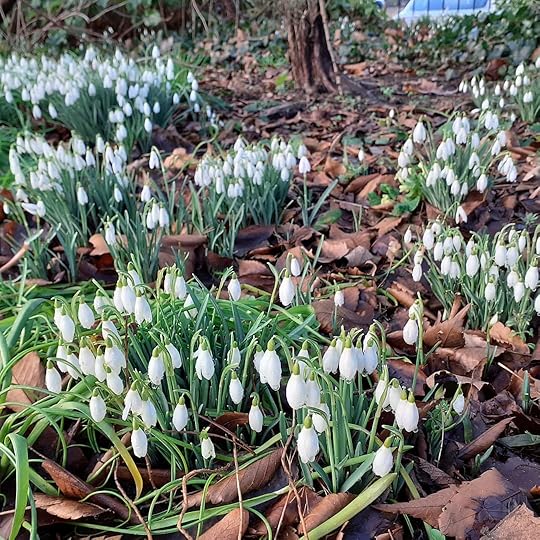
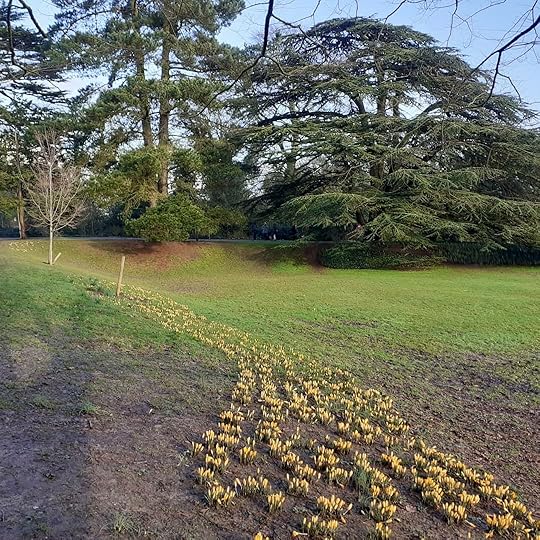
Jephson Gardens, Leamington Spa, offer the early signs of spring, and hope that we will move out of lockdown before too long and can perhaps look forward to a return to new life.







